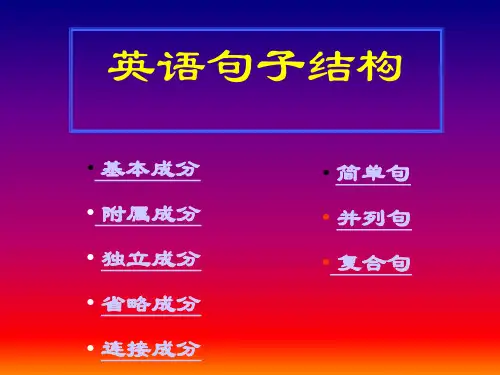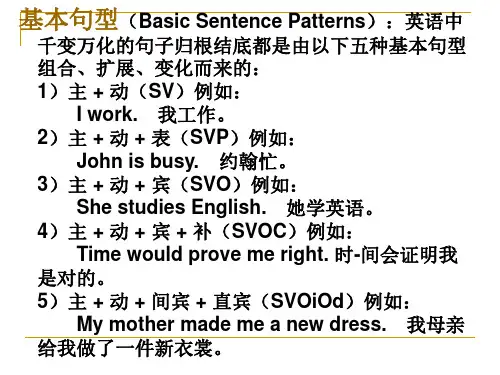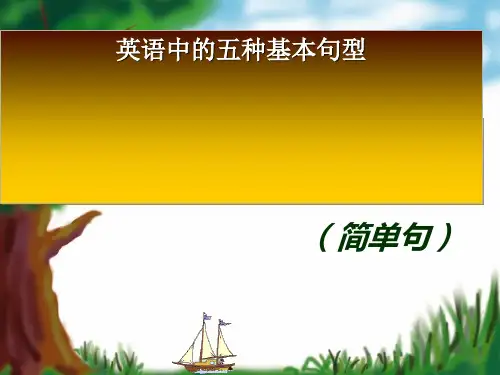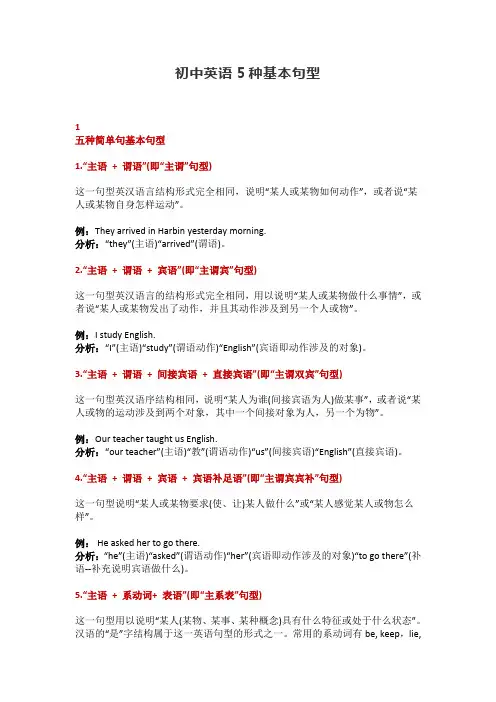初中英语五种基本句型ppt课件
- 格式:ppt
- 大小:1.48 MB
- 文档页数:21











初中英语5种基本句型1五种简单句基本句型1.“主语+ 谓语”(即“主谓”句型)这一句型英汉语言结构形式完全相同,说明“某人或某物如何动作”,或者说“某人或某物自身怎样运动”。
例:They arrived in Harbin yesterday morning.分析:“they”(主语)“arrived”(谓语)。
2.“主语+ 谓语+ 宾语”(即“主谓宾”句型)这一句型英汉语言的结构形式完全相同,用以说明“某人或某物做什么事情”,或者说“某人或某物发出了动作,并且其动作涉及到另一个人或物”。
例:I study English.分析:“I”(主语)“study”(谓语动作)“English”(宾语即动作涉及的对象)。
3.“主语+ 谓语+ 间接宾语+ 直接宾语”(即“主谓双宾”句型)这一句型英汉语序结构相同,说明“某人为谁(间接宾语为人)做某事”,或者说“某人或物的运动涉及到两个对象,其中一个间接对象为人,另一个为物”。
例:Our teacher taught us English.分析:“our teacher”(主语)“教”(谓语动作)“us”(间接宾语)“English”(直接宾语)。
4.“主语+ 谓语+ 宾语+ 宾语补足语”(即“主谓宾宾补”句型)这一句型说明“某人或某物要求(使、让)某人做什么”或“某人感觉某人或物怎么样”。
例: He asked her to go there.分析:“he”(主语)“asked”(谓语动作)“her”(宾语即动作涉及的对象)“to go there”(补语--补充说明宾语做什么)。
5.“主语+ 系动词+ 表语”(即“主系表”句型)这一句型用以说明“某人(某物、某事、某种概念)具有什么特征或处于什么状态”。
汉语的“是”字结构属于这一英语句型的形式之一。
常用的系动词有be, keep,lie,remain, stand, become, fall, get, go, grow, turn, look, feel, seem, smell, sound, taste, 等。
第一章五大基本句型一、主语+不及物动词(S+vi。
)Birds fly。
鸟会飞.The birds are flying over the building. 那些鸟正飞过大楼上空.He sits in the back row. 他坐在后排。
二、主语+及物动词+宾语(S+vt。
+O)My brother studies history. 我哥哥研究历史.I put the newspaper on the table. 我把报纸放在了桌上。
She only wants an apple. 她只想要一个苹果.三、主语+系动词+表语(S+v.+P)The flowers are very beautiful。
这些花非常漂亮.The music sounds very sweet。
这个音乐听起来很甜美。
I feel sleepy today. 我今天感觉很累.四、主语+及物动词+简接宾语+直接宾语(S+vt. +IO+DO)Our English teacher often tells us stories in English。
我们的英语老师经常用英语给我们讲故事。
I will find you a good chance as long as you won’t lose heart。
只要你不失去信心,我会给你找个好机会的。
My parents bought me a nice Christmas present。
我父母为我卖了一件精美的圣诞礼物。
五、主语+及物动词+宾语+宾语补足语(S+vt.+O+C)They made her happy. 他们使她高兴。
They painted the door red。
他们把门漆成了红色。
I can hear someone playing the violin next door. 我听见有人在隔壁拉小提琴。
第二章句型成分:主语和宾语一、名词1、名词的数名词分为可数名词和不可数名词。